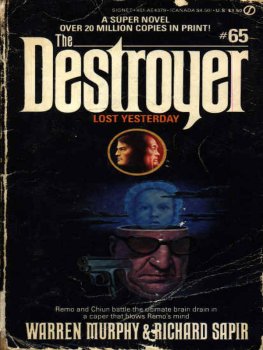Warren Murphy - Line of Succession
Here you can read online Warren Murphy - Line of Succession full text of the book (entire story) in english for free. Download pdf and epub, get meaning, cover and reviews about this ebook. genre: Science fiction. Description of the work, (preface) as well as reviews are available. Best literature library LitArk.com created for fans of good reading and offers a wide selection of genres:
Romance novel
Science fiction
Adventure
Detective
Science
History
Home and family
Prose
Art
Politics
Computer
Non-fiction
Religion
Business
Children
Humor
Choose a favorite category and find really read worthwhile books. Enjoy immersion in the world of imagination, feel the emotions of the characters or learn something new for yourself, make an fascinating discovery.

- Book:Line of Succession
- Author:
- Genre:
- Rating:3 / 5
- Favourites:Add to favourites
- Your mark:
- 60
- 1
- 2
- 3
- 4
- 5
Line of Succession: summary, description and annotation
We offer to read an annotation, description, summary or preface (depends on what the author of the book "Line of Succession" wrote himself). If you haven't found the necessary information about the book — write in the comments, we will try to find it.
Line of Succession — read online for free the complete book (whole text) full work
Below is the text of the book, divided by pages. System saving the place of the last page read, allows you to conveniently read the book "Line of Succession" online for free, without having to search again every time where you left off. Put a bookmark, and you can go to the page where you finished reading at any time.
Font size:
Interval:
Bookmark:
Destroyer 73: Line of Succession
By Warren Murphy and Richard Sapir
Chapter 1
Old Pullyang was the first to see the strange purple birds.
Pullyang squatted in the dirt, smoking a long-stemmed pipe and letting the last warming rays of the day soak into his elderly bones. Smoking kept him awake, for he was the caretaker of the village of Sinanju, the birthplace of the sun source of the martial arts, which was also known as Sinanju. And being the guardian of the sleepy little town on the West Korea Bay meant unrelieved boredom.
No one came to Sinanju who was not of Sinanju. Sinanju had no enemies, no natural resources, no desirable real estate. It did have a treasure, but few knew of it. Those who knew dared not seek it. The reputation of the Masters of Sinanju, a line of assassins that went back some three thousand years, was a greater deterrent to thieves than an armored division.
Thus, old Pullyang squatted in the sun, smoking to keep awake and patiently awaiting the return of the Master of Sinanju, knowing that he had nothing to fear except nodding off. If he nodded off, the other villagers would note the day and the hour and inform the Master of Sinanju upon his return. Then Pullyang would surely be punished and one of them would be appointed in his place. The post of caretaker of the treasure house was much coveted in Sinanju for it allowed one to indulge in the chief village trait, which was a kind of studied laziness, without fear of scorn or punishment.
Pullyang watched intently as the sun set over the surging waters of the bay, falling between the twin rock formations on the beach that were known as the Horns of Welcome. The ocean turned red. This was Pullyang's favorite time of day. It meant that mealtime approached.
Just as the solar disk touched the water, Pullyang's pipe went out.
Old Pullyang muttered imprecations under his breath because relighting the pipe meant a good deal of work. The stem was over four feet long. First he would have to reel in the bowl. Then he would have to stand up and walk over to one of the cooking fires for a smoking ember. That was the difficult part.
Old Pullyang never got to the difficult part. After he had peered intently at his pipe bowl, he happened to look up. He saw the birds.
There were two of them. They flew over the village in a languorous circle. At first Pullyang thought they were very near. Their wingspans seemed huge. But on closer inspection, he realized that they were very, very high up.
That bothered old Pullyang even more. The birds were so high above that they were black against the sky, yet they still seemed large.
Old Pullyang thought the large birds might be herons. They had long-billed heads and very long necks like herons. Their floating wings resembled heron wings. But they were too big for herons. It was a puzzlement.
Clambering to his feet, he called down to the other villagers. He called them as a group, adding the words "lazy ones" because it made him feel good after squatting all day to call the others lazy.
"Look!" he called, pointing to the sky. His long-stemmed pipe quivered in his hand.
The villagers stopped their preparations for the evening meal and looked up.
They all saw the lazily circling birds, black and indistinct because they were so high.
"What are they?" someone asked fearfully.
But Pullyang, who was the village elder after the Master of Sinanju, did not know.
"It is an omen," he proclaimed loudly.
"Of what?" asked Mah-Li, who was the betrothed of the next Master. She was very young, with lustrous black hair framing an innocent face.
"Of evil," said old Pullyang sagely, who knew being ignorant was not the same as admitting it.
The villagers gathered about the treasure house of Sinanju, which was built of fine woods on a low hill in the center of the village, because it represented safety. All of them watched the ominous birds. The sun's glowing rim slipped into the water, making it seem to bleed. It appeared as if the birds were dipping lower too.
"They are coming down," said Mah-Li, her eyes wide.
"Yes," said Pullyang. He could see their color now. It was purplish-pink, like the internal organs of the pigs they slaughtered for food.
"They have no feathers," whispered Mah-Li.
It was true. The birds were featherless. They had wings like bats-leathery purple wings that flapped and folded nervously as they circled lower, their hatchet faces twisting so that their side-mounted eyes could look down.
Their eyes were bright green, like lizard eyes. They were definitely not herons.
The children were the first to break and run. Naturally, the mothers ran after them, screaming. The men were next. There was a frantic exodus to the path that wound beyond the rocks to higher ground, away from the village.
Old Pullyang turned to Mah-Li. "Go, child," he quavered.
"You come too," Mah-Li urged, pulling on his skeletal arm.
Pullyang struggled free, dropping his pipe. "No! No!" he spat. "Go! Away from here!"
Mah-Li looked up at the purple birds, and she backed away.
"Please!" she cried.
Stubbornly Pullyang turned his back to her. Mah-Li turned and ran after the others.
Old Pullyang was left alone. He shrank back under the curving edges of the treasure-house roof, where he hoped the circling birds could not see him.
The birds swooped over the Horns of Welcome. Pullyang saw that their huge wings were bright and shiny like the plastic toys that were sometimes brought to the village from the cities. And then they settled, one on each horn, folding their wings close to their hairless bodies like creatures in mourning. They were three men high.
Old Pullyang huddled on the ground. He was alone and the baleful green eyes of the birds-that-were-not-birds were fixed squarely on him. The birds did not move. They simply stared. The sun disappeared under the ocean, its dying rays backlighting the purple birds.
Old Pullyang was determined not to leave his post. It was his duty. He would not shirk it. He would remain. No tattletale villager would ever say to the Master of Sinanju that Pullyang, the caretaker, had forsaken his sacred responsibility.
Night fell. The two birds became two shadows with eyes. The eyes did not wink in those bony hatchet faces. They stared at Pullyang as if they had all eternity in which to stare.
Pullyang set his teeth together to keep them from chattering. Let them stare. They could stare for all time. Pullyang would not flee. He wished he had gone for that smoking ember, though. His pipe would have tasted very good right now. More than anything, he wished his pipe had never gone out. Perhaps if it had not, Pullyang would not have looked into the sky and seen the circling birds in the first place. Superstitiously, he believed they had come to earth because he had seen them. He was convinced of this. It was the way they stared at him with their unwinking serpent eyes.
Pullyang huddled before the door of the treasure house, a determined old man, and squeezed his eyes shut.
When the moon came up, throwing the beach into relief, Pullyang could not resist checking to see if the purple birds still roosted in the moonlight.
He saw that the moon had thrown long shadows across the rocky beach. The Horns of Welcome made those shadows. Then Pullyang noticed that the birds, perched on top of the Horns, cast no shadows.
With a screech of fright, Pullyang ran-away from the treasure house, away from his responsibility, and most of all, away from his fear. He ran up the inland path after the others.
Pullyang did not look back. He did not want the evil purple birds to follow him.
The moonlight transformed the village of Sinanju into a landscape of stark peace. Into this peace strode a man. He was a white man with a too-handsome face that was just beginning to take on the angular planes of maturity. Sea breezes tossed his long blond hair. He wore a two-piece garment of purple silk, a yellow sash belted around his middle. Serpents retreated from the path of his sandaled feet, as if in fear.
Next pageFont size:
Interval:
Bookmark:
Similar books «Line of Succession»
Look at similar books to Line of Succession. We have selected literature similar in name and meaning in the hope of providing readers with more options to find new, interesting, not yet read works.
Discussion, reviews of the book Line of Succession and just readers' own opinions. Leave your comments, write what you think about the work, its meaning or the main characters. Specify what exactly you liked and what you didn't like, and why you think so.



